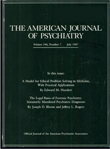IQ Decline During Childhood and Adult Psychotic Symptoms in a Community Sample: A 19-Year Longitudinal Study
Abstract
OBJECTIVE: The goal of this study was to examine cognitive antecedents of psychosis by determining whether variability in IQ during childhood was predictive of psychotic symptoms in adulthood. METHOD: Deviant responder analyses were used to examine prospectively the relationship of IQ at ages 4 and 7 to psychotic symptoms at age 23 in 547 offspring from a community sample (National Collaborative Perinatal Project) that was unselected for psychiatric illness. The authors compared three hypotheses: that 1) low IQ, 2) large IQ fluctuations regardless of direction, or 3) large IQ declines would predict the presence of adult psychotic symptoms. RESULTS: The 10% of individuals with substantially larger than expected IQ declines from age 4 to 7 had a rate of psychotic, but not other psychiatric, symptoms at age 23 that was nearly seven times as high as the rate for other persons. Parental socioeconomic status and IQ at age 7 also predicted adult psychotic symptoms. However, when IQ at age 7, IQ decline between ages 4 and 7, and socioeconomic status were all included in a logistic regression analysis, only IQ decline remained significant. CONCLUSIONS: There is an increased likelihood of developing psychotic symptoms in adulthood for a subgroup of individuals with substantially greater than expected IQ declines during childhood. IQ decline is specific for psychotic symptoms, but follow-up assessment when the study participants are further into the age of risk will be necessary to determine specificity for schizophrenia. The authors discuss the implications of this early cognitive downturn for a neurodevelopmental view of schizophrenia.



